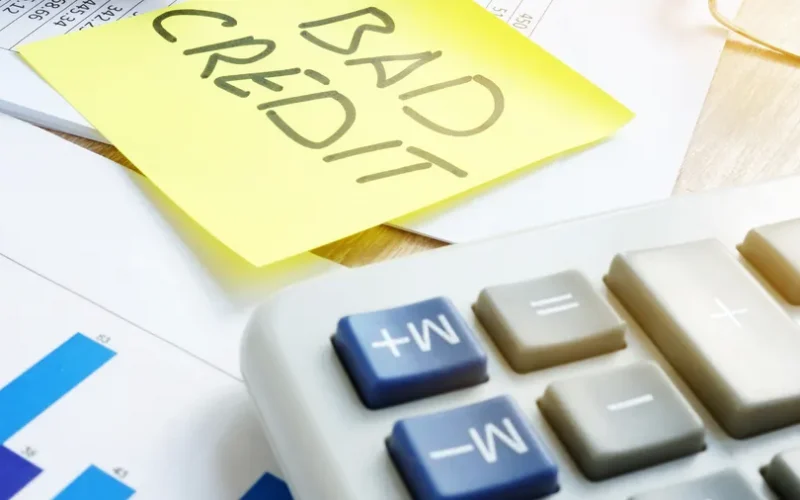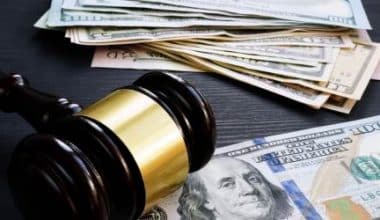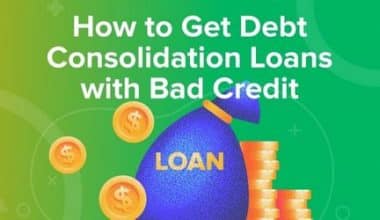About a quarter of Americans (23%) have credit scores in the “poor to fair” range (300–649). You may be among the millions who have experienced the difficulty of trying to find a personal loan lender who will work with you. Customers with poor credit ratings (often 550 to 629) can apply for and receive bad credit loans. If this describes you, direct lenders who specialize in personal loans for people with poor credit histories may be willing to work with you. There is typically a short application process and quick funding with these lenders. In this article, we will discuss mortgage and direct loan lenders for poor credit.
What Are Lenders for Poor Credit?
Lenders for poor credit are vendors that provide loans to individuals who have had little to no opportunity to create a credit history or who have encountered some difficulties.
Obtaining a loan with a poor credit score below 580 can be challenging, but the lenders on this list are able to help people with scores in the 580 to 600 range. It is important to verify that your credit score meets the minimum requirements of the lender of your choice.
However, applicants with poor credit histories will likely face higher interest rates from lenders and lower credit limits when applying for loans. Applicants with the highest qualifications will receive the best prices and terms.
Loan Options for Those with Poor Credit
You can get a secured loan or an unsecured loan if you need money for personal reasons. However, there are other loan options if you have terrible credit and are having problems getting a personal loan.
#1. Secured & Unsecured Poor Credit Personal Loans
Personal loans in the conventional sense can be either secured or unsecured. When you apply for a secured loan, you’ll need to put up some sort of valuable asset, like your car, savings account, or home, as collateral. If you default on your loan payments, the lender might take back the collateral. This reduces the risk to the lender, which usually results in better terms such as reduced interest rates and easier eligibility requirements.
However, unsecured loans are more popular and don’t have the pledge of any assets as security. These loans often have tougher eligibility standards and higher interest rates than secured loans because of the additional risk they bring to lenders when given out. All of the loans included here are unsecured forms of credit.
#2. Home Equity Loans & HELOCs for Poor Credit
It is possible to qualify for a home equity loan or home equity line of credit (HELOC) if your home is worth more than what you owe on your mortgage. Both allow you to take money out using your house as collateral, so the lender can take it back if you don’t pay. While HELOCs allow you to withdraw money whenever you need it, home equity loans can only be taken out in one large sum.
However, applicants with poor credit histories have little chance of being approved for these types of loans. The typical minimum credit score required by traditional lenders is 620. Some niche banks and credit unions may be more flexible, although this is unusual. Those with poor credit scores below 600 will need to approach hard money lenders instead of a traditional bank. Hard money lenders may be more accommodating, but they also tend to charge more.
#3. Loans for Students with Poor Credit
A student loan for poor credit may be the best option for those who need financial aid to pay for college. Federal student loans do not conduct a credit check and are therefore an option for those with poor credit who do not qualify for private student loans. Loan forgiveness is an option for those who take out federal loans and work in the public sector, and these loans offer the most adaptable repayment terms overall.
#4. Poor credit Auto Loans
Auto loans are secured loans that use your vehicle as collateral, so the lender has the right to take it back if you default on your payments.
The conditions for getting a car loan can be different depending on the dealer and the lender. We recommend a credit score of 670 or higher to get the best rates and terms on an auto loan, but those with lower scores may still be able to get approved by meeting the debt-to-income (DTI) ratio and down payment criteria.
#5. Poor Credit Payday Loans
Payday loans are small, short-term loans (often up to $500) that must be repaid in full when the borrower receives his or her next salary, typically two to four weeks after the loan was taken out. The fact that many lenders are willing to work with borrowers despite poor credit makes them attractive. Not to dash your aspirations or anything. There are a lot of dangers and exorbitant costs associated with payday loans. You could look into other options first, such as a personal loan or borrowing from loved ones. Also, read Mortgage with Low Credit Score 2023 & All You Need
How to Get a Loan With Poor Credit
If your credit score is poor, you may find it difficult to secure a loan from lenders. Poor credit could limit your options and lead to more expensive loan offers. Many reputable lenders, however, have far lower minimum credit scores and will also look at things like your income, obligations, collateral, and credit history.
Lenders may consider a borrower to have poor credit if their FICO® Score is below 670. Scores below 670 indicate “fair” or “poor” financial health, respectively. Although your borrowing alternatives may be more limited if you have poor credit, it is still feasible to get a loan. The methodology is as follows.
#1. Verify Your Credit Reports and Score
Knowing your credit score is crucial before you start the procedure. You can acquire a free credit report and credit score from Experian, in addition to free reports from the other two major credit reporting agencies (TransUnion and Equifax) at AnnualCreditReport.com.
View your credit report to discover how potential lenders will view your application for credit. Investigate any red flags that may be lurking in your credit reports, such as late payments or canceled accounts. The next stage is to make permanent changes to the way you use credit moving forward.
Furthermore, you have the right to dispute the entries on your credit report if you believe any of the information contained therein is inaccurate or the product of fraud. Credit reporting agencies will assist creditors in resolving disputes over inaccurate or incomplete information. Verification results will determine whether or not the contested data will be rectified or deleted. If the item you are disputing is proven to be true, it will remain on your credit report.
#2. Learn the Hidden Costs of Poor Credit Loans
Borrowers with poor credit histories typically pay higher interest rates on loans. When making loans to borrowers with poor credit histories, certain lenders may choose to compensate for the additional risk they are taking by charging a higher APR.
Take the case of someone seeking a $10,000 loan with a three-year repayment term as an example.
- Loans for those with poor credit may come with high-interest rates and fees. A total of $419 each month and $5,086 in interest would be owed by the time the loan was paid off.
- You may be offered a loan with an origination fee of 1% and an interest rate of 10% if your credit is excellent. About $323 will be due each month, for a total of $1,616 in interest during the loan’s lifetime.
The annual percentage rate (APR) of a loan is calculated by adding together the loan’s interest rate, any fees associated with the loan, and the number of years over which the loan must be repaid. There is typically an APR range advertised alongside loans; the actual APR you are offered may vary based on factors such as your credit history, the amount borrowed, and the length of time over which you must return the loan.
In addition, make sure you can afford the monthly payments and interest on a loan before you apply for one.
#3. Compare Different Loan Options
Different lenders have different loan criteria, so it’s in your best interest to shop around and compare loans and rates. You may find the best personal loan terms, including APR and costs, by shopping around. If you’re in need of a loan but have poor credit, there are many lenders who can help.
Experian CreditMatchTM is a useful tool that does just that, finding you customized loan offers based on your location, FICO® Score, and desired loan terms. Some lenders and online loan marketplaces have extremely poor credit score minimums, while others have none at all.
#4. Seek a Cosigner
If you apply for a loan with a cosigner who has excellent credit, you may get a better interest rate or other terms. Your cosigner must be willing to assume full financial liability for the loan in the event that you fail to do so.
In order to get a loan, many people ask a relative or close acquaintance to cosign for them. Your cosigner will also need to provide personal details like income, credit history, and credit score as part of the application procedure.
Even if you and your cosigner are very close, the stress of a loan and the potential for default can put a strain on your relationship. Keep your cosigner informed of your progress in repaying the debt by keeping in regular contact with them.
#5. Look into Secured Loans
To get a lower interest rate on a loan, borrowers may use their property or a vehicle as collateral. Because the lender’s risk is mitigated, secured loans often have lower interest rates than their unsecured counterparts. A secured loan could be the best way to receive a loan with a manageable interest rate if you have poor credit.
One major drawback of secured loans is that your collateral may be taken by the lender if you fail to make your payments. Take out a secured loan only if you know you can afford to pay it back on time every month.
#6. Learn Your Loan Eligibility Status
You may check your eligibility for a loan and get an idea of what kind of loan terms you might be offered by submitting an online prequalification with many personal loan providers.
Instead of applying with each individual lender, you can use the CreditMatch function in your Experian account. Then, Experian will show you the loan offers it has received from its network of partner lenders, allowing you to choose the one that best suits your needs.
How Can I Build My Credit Fast?
Would you believe it if I told you it was easier than ever to establish credit these days? You can start to regain control of your credit by adding your name as an authorized user on an existing credit card held by someone else. You can use the rent and utility payments you already send each month as leverage by sharing this information with credit bureaus.
Here are some methods you can take to rapidly increase your credit history’s positive entries.
#1. Budgeting Your Credit Card Payments Is Essential
Credit usage refers to how much of your available credit you’re actually using. Never go over 30% of your card’s limit, and even less is preferable. In most cases, the top achievers had low credit utilization rates.
Keep your balances low so that the information reported to the credit bureaus is favorable to your creditworthiness. A simple strategy for this is to pay off as much of the sum as possible before the end of the billing cycle or to make multiple payments during the month.
The effect was profound. After paying your bills on time, your credit usage ratio will determine your credit score.
The time requirement is moderate. Plan in advance to make sure you remember to log in and pay your bills. Credit card companies may also offer alerts that notify you when your balance reaches a certain threshold.
Also, the speed with which it could work is, in a word, rapid. Credit utilization ratios are updated as soon as your credit card company reports a decreased amount to the credit bureaus.
#2. Get a Rent/Utility Payment Credit
On-time rent payments can be reported by rent reporting agencies and included in credit reports. Not all scoring models take rent into account; whereas VantageScores does, FICO 8 does not. Still, if a potential lender checks your credit reports, they will see your rental history, and a long track record of regular payments will appear good.
Experian Boost could be useful as well. The free Boost service works by having users link their bank accounts so that it may automatically scan for payments to streaming services, phone bills, energy bills, and rent that qualify for the service. Your Experian credit record will reflect only the payments you authorize. The additional payment history is a boon if a creditor checks your FICO 8 using Experian data.
#3. Always Be Prompt With Your Bill Payments
If you consistently pay late, no amount of effort will be enough to enhance your credit score. A late payment can remain on your credit report for as long as seven and a half years.
If you are more than 30 days late with a payment, you should get in touch with your creditor. If you can, make the payment as soon as you can and see if the creditor will stop reporting the late payment. Also, if the creditor is unwilling to negotiate, you should still try to bring the account current as soon as possible. Credit scores take a hit if you have accounts that are past due every month.
#4. Register as a Valid User
Inquire about being an authorized user on a loved one’s credit card account if that cardholder has a high credit limit and a track record of timely payments. That way, the account will show up on your credit reports and its credit limit will contribute to your utilization ratio. Authorized user status, sometimes known as “credit piggybacking,” allows you to capitalize on the good payment history of the primary user. Your credit score will rise regardless of whether or not the account holder gives you access to the card or even the account number.
For the most impact, it’s better if the account reports to all three major lenders (Equifax, Experian, and TransUnion).
#5. Expand Your Credit Portfolio
Your credit score could benefit from having an additional, active credit account, especially if it’s a different kind of credit than what you already have.
You should look into getting a loan if you only have credit cards; a credit-builder loan may be a good, inexpensive option. Verify that all three credit agencies will receive information about the loan you are considering adding.
It could be helpful to get a new credit card if you simply have loans or a few credit cards. More available credit has multiple benefits, including a better credit mix and lower credit use.
What Makes up a Bad Credit Score?
The following five factors are used in FICO’s credit scoring model. Your score will go down if you have problems meeting these financial obligations.
- Receipts and payments. 35%. The biggest component in your score is how you’ve always paid your bills on time. A large decline in the score is likely if you have a history of paying bills late.
- Payment Due. The percentage is 30%. The sum of all your debts is referred to as your debt-to-income ratio, or DTI for short. Lenders may view borrowers with high debt-to-income ratios as being more likely to default on their loans.
- Credit History Length. A percentage point equal to 15%. The length of time you’ve had open credit accounts is a major factor in your score. The length of time that has passed since you last used a certain line of credit or account counts in this.
- Funds Increase. 10% of your score comes from how recently and how many new credit accounts you’ve started. You should try to limit the number of new accounts you open at once to protect your credit score.
- Credit mix. It’s only 10%. The term “credit mix” refers to the variety of credit you use. This entails anything from a fixed-rate mortgage to a credit card to a retail account. Having a fair selection of credit providers is recommended.
Overview of the Top Best Lenders for Poor Credit
Here are some of the best lenders for poor credit.
#1. Best Egg
Use caution when taking out a personal loan to pay off high-interest debt, as doing so could lead to further financial difficulties. Direct payments to your creditors are just one way that Best Egg streamlines the debt-repayment process.
Best Egg will send payments to your credit card companies and medical bill collectors once you are authorized for a debt consolidation loan. That way, there’s no opportunity for frivolous spending because the funds never enter your account.
If you need money quickly, Best Egg can get the money to you in as soon as one business day, and if you don’t qualify for an unsecured loan, they also provide secured loans.
#2. Rocket Loans
In the event of an emergency bill, you can’t afford to wait for a lender to transfer the money to your account. If you need money quickly, Rocket Loans is the greatest option because you could get the money the same day you apply.
If you apply for a loan and sign the promissory note before 1 pm Eastern Time on a business day, you may receive funding the very same day. You can expect an ACH transfer from Rocket Loans to your bank account. Keep in mind that if there are any delays in processing at your bank, the money may not be available right away.
You can get a loan from Rocket for up to $45,000, and you have up to 60 months to pay it back.
Also, you can save money on your loan’s interest by signing up for automated payments.
The money from a Rocket Loan can be put toward everything from medical expenses and debt reduction to the purchase of solar panels and house renovations.
#3. Avant
It’s understandable to want to fix your finances and boost your credit score after getting a personal loan with bad credit. If your credit score rises, you may qualify for a lower interest rate on your personal loan. A personal loan’s interest rate can be lowered by refinancing it with Avant, but many banks won’t let you do so if you already have a loan with them.
If you have a poor or acceptable credit score but need a loan quickly, you might look at Avant one of the top lenders, because of its fast funding and low minimum credit score requirement of 550.
#4. PenFed Credit Union
Many personal loan providers don’t allow you to have someone else vouch for you, so you’ll have to prove your own eligibility on your own. That can make it challenging for borrowers with less-than-perfect credit or inadequate income to secure a loan.
However, personal loans from PenFed Credit Union can be obtained for amounts between $600 and $50,000.
While the minimum credit score of 650 is higher than what is required by some of the other lenders on this list, co-borrowers are welcome to apply. It’s possible that a loan with more favorable terms could be obtained if you applied with a creditworthy co-borrower.
PenFed is one of the few lenders that offer payment plans for personal loan borrowers during times of unemployment or poor credit history, and they do so without charging any origination costs. PenFed is a credit union, but anyone can become a member.
#5. Upstart
Loans can be difficult to come by if your credit score falls between the “poor” range of 300 to 579. It can be much more challenging to locate a loan that doesn’t come with an annual percentage rate well into the upper double or triple digits.
To fill this void, there is Upstart. When compared to the other lenders we looked at, this one has the lowest necessary credit score of any of them: just 300 out of a possible 850.
If authorized, you may get your loan proceeds in as little as one business day, and the maximum amount you may borrow is $50,000.
Mortgage Lenders for Poor Credit
You don’t have to settle for a subpar mortgage lender just because your FICO score isn’t as high as you’d like it to be. Some of the best lenders out there will work with applicants who have poor credit scores just below 600.
No one should expect to be accepted. And your interest rate will be greater than that of a borrower with a “prime” mortgage. However, just like any other homebuyer, you have the right to shop around for the most favorable terms, including interest rates, fees, and customer service.
When you have terrible credit, getting a home loan can be difficult. However, there are a number of lenders that focus on providing mortgage loans to those with poor credit.
According to research on national average mortgage interest rates*, the five companies below are the best options for homebuyers with poor credit.
Keep in mind that while these mortgage lenders may be more lenient now, you can get even better loan terms in the future if you practice good money management and work to boost your poor credit score. Related Article: BAD CREDIT MORTGAGE: How to get it, Top Lenders & Guaranteed Approval
What’s Considered ‘Poor Credit’ for a Mortgage?
The FICO scoring methodology is frequently utilized by financial institutions because it was developed by the business FICO. It considers scores below 580 to be “poor.”
In reality, a score in the range of 580-669 is regarded as “fair.” It’s good if it’s between 670 and 739, and extraordinary if it’s higher than 740.
- Sub-570 = Poor Credit
- 580-669: Acceptable Grades
- 670-739: Excellent to Good
- When your score is above 740, you have excellent credit.
But since banks can set their own standards for what constitutes both excellent and poor credit, it’s crucial to realize that ” poor credit” can mean different things to different people. This means that a credit score that is considered poor by one lender may be absolutely fine by another.
Even if your credit score is poor, it is still possible to be granted a mortgage by some lenders. However, you’ll need a hefty down payment and an explanation that puts your low credit score in context.
You may also need to find a lender who is willing to work with you on terms. And that’s where our directory of top mortgage lenders for people with poor credit comes in.
What Type of Mortgage Can I Get With Bad Credit?
Obviously, you’re not only looking for the top poor credit loan lenders. You should look for a mortgage plan that suits your specific requirements. Most importantly, they are:
- FHA loans. Borrowers with poor credit histories are best served by FHA loans, which are insured by the Federal Housing Administration. Borrowers with credit scores as low as 580 often need to put down a 5% down payment. A credit score of 500-579 may qualify you for an FHA mortgage, but only if you can put down a 10% down payment.
- VA loans. There is no set minimum credit score required for a VA loan. However, 620 is the minimum score required by the vast majority of loan providers. Some even drop to the 580s. Some financial institutions, like Navy Federal Credit Union, are more forgiving if your credit score is poor for a good cause and do not require a minimum. Veterans United was not included since qualifying would require a credit score of 660 or higher.
- USDA loans. Borrowers with poor credit may not fare well with USDA loans because of the minimum credit score requirement of 640. A USDA loan allows you to buy a home with no down payment required provided your credit is good enough.
- Non-conforming loans. Because of the discretionary nature of these loans, some banks and credit unions may approve borrowers with credit scores below 600.
Overview of the Best Mortgage Lenders for Poor Credit
Here are the top mortgage lenders for poor credit.
#1. Navy Federal Credit Union
Members of the Navy, Marine Corps, Coast Guard, and the U.S. Armed Forces, both active and retired, as well as their immediate family members, are eligible for the full range of benefits offered by Navy Federal Credit Union. While the minimum credit score needed to qualify for a mortgage with this lender is not made public, Navy Federal Credit Union is known for working closely with its members to assess their needs and identify the best mortgage option for them.
The RealtyPlus program offers homebuyers a chance to get a discount of up to $9,000 on the purchase price of a house. For a low down payment mortgage with this lender, private mortgage insurance (PMI) is not required.
Furthermore, you can get a VA loan from Navy Federal Credit Union with no money down and the credit union will cover closing expenses equal to 4% of the loan amount. In contrast to the VA loan, which requires a 0% down payment and no private mortgage insurance (PMI), the Military Choice mortgage permits sellers to pay up to 6% of the home’s value in closing expenses.
#2. Citi Mortgage
When applying for a mortgage through Citi’s HomeRun program, borrowers can put down as little as 3% without having to pay private mortgage insurance (PMI), a monthly charge that is typically required with other mortgage plans if the down payment is 20% or less and can quickly eat away at a monthly budget. You can use this program to refinance your mortgage even if you have previously bought a home.
Also, if you get a HomeRun mortgage, you can secure a fixed interest rate for the life of the loan, eliminating the risk of paying higher rates later. Borrowing amounts of up to $1,089,300 (or up to $1,262,200 in Hawaii and Alaska) can be accommodated under this mortgage program.
Citi’s other mortgage loans, which aren’t part of the HomeRun program, are available to prospective customers with poor credit at a reduced rate.
#3. Rocket Mortgage
In recent years, Rocket Mortgage has risen to prominence as one of the nation’s largest mortgage providers. Although most mortgage lenders require a score of at least 620 to qualify for a loan, Rocket Mortgage will work with borrowers who have a poor credit history.
In fact, the financial institution offers a no-cost service called “Fresh Start” to assist those who are interested in applying but need to raise their credit score first. It’s important to remember that if your credit isn’t perfect and you still want a mortgage, you can end up paying interest rates closer to the top of the lender’s APR range.
While Rocket Mortgage is a good choice for those looking for a conventional loan, an FHA loan, a VA loan, or a jumbo loan, it is not the best choice for those seeking a USDA loan, which requires no money down from the borrower. If you are only interested in purchasing an existing single-family home, second home, or condo, then the fact that Rocket Mortgage does not provide construction loans (for building a brand new custom home) or a home equity line of credit (also called a HELOC) is not a deal breaker.
Direct Loan Lenders for Poor Credit
Loans from direct lenders for those with poor credit history often come with very high rates of interest. Lenders see borrowers who have poor credit ratings as riskier investments.
However, if the loan is secured, meaning that you have to put up collateral to get it, the direct lender may be able to give a more favorable interest rate.
If you need money but are worried about making monthly payments on a high-interest loan, you should look into other financing choices before making that decision. Instead of taking out a loan to cover expenses, see if you can negotiate a payment plan with your service providers. This will buy you some time to get back on your feet while still allowing you to keep paying your bills.
If you’re a member of a federal credit union, you might be eligible for a PAL, or a payday alternative loan. These short loans have fixed interest rates to help consumers bridge a temporary financial gap. If you must take out a high-interest loan, you may be able to have it paid off sooner by making extra payments toward the principal instead of the interest.
Overview Of The Best Direct Lenders for Poor Credit
These direct lenders are among the best in the country for people with poor credit and offer fast loan funding. Loans are approved and processed quickly; this company has a reputation for never being late. You’ll get the money in your account before you finish all the required papers. Before committing to one lender, it’s wise to do some research about the others. So, to assist you choose wisely, we’ve included our assessments of the various loan companies.
#1. Fast Money Source
If you have poor credit and need a loan, Fast Money Source is one of your best options for direct lenders. For those in a bind financially, they provide a variety of short-term lending solutions.
People with poor credit are likely to be attracted to this direct lender because of its numerous convenient features. Among these characteristics are:
- Loan amounts up to $50,000 may be requested
- You won’t have to wait long for a loan decision.
- Quickly obtaining funding
- You may rely on them for quick, easy loans.
- You can get a payday loan with an interest rate as low as 6%.
- Credit-repair services and debt-relief programs are among the many more services offered.
- They offer microloans starting as little $100.
- There are no hidden costs or up-front costs.
- There are no credit checks done.
Simply submit an application on their website or contact customer service whenever you need a loan. This company maintains a transparent business model thanks to its membership in the Online Lenders Alliance. Review the loan’s terms, including its fees and interest rate, before deciding whether or not to accept it once you receive permission.
#2. Honest Loans
To get started with Honest Loans, the 24-hour loan disbursement services, just fill out the short online application and you’ll hear back from the team in record time. Here are some of the many good reasons to look into the loans offered by one of this top-tier direct lenders for people with poor credit.
- The loan can be dispersed in less than a day
- There is no need to check credit.
- Not an issue even if you’re on a tight budget
- Loans up to $50,000 may be requested.
- Personal Loans, Cash Advance Loans, Installment Loans, etc. are just a few of the many loan programs available.
- Be aware of the interest rate and fees prior to loan acceptance.
Their quick payday loan service is attractive because of their low-interest rate and the speed with which they handle and approve loans. But before signing with a direct lender, be sure to read their stipulations. Is it time for your Honest Loans loan now?
#3. Credit Clock
Credit Clock is rapidly becoming the top payday loans company in the United States by providing you with guaranteed online loans. Tribal loans, or loans made by businesses owned by members of Indian or Native American tribes, are also available quickly. When money is tight, they’ll be your best ally. In addition, this lending institution offers:
- Payday loans at incredibly cheap interest rates, starting at.59%
- It takes as little as 2 minutes to submit an application.
- Loan conditions are negotiable.
- Trustworthy, direct loan providers
- Native American- and Indian-owned financial institutions
Another trustworthy loan provider, they provide emergency cash without a lot of hassle. Their lowest loan amount is $500 and their highest is $2,000. In addition, the loan payment schedule is flexible, between 6 and 24 months.
How to Spot Scams for Poor Credit Loans
Some loans for people with poor credit seem too good to be true, but they do exist. Here are several red flags that could indicate you’re dealing with a predatory lender:
- The lender requires an up-front payment of fees. No reputable lender would need payment before loan approval and funding. Application and credit report fees may be required by reputable lenders, although they are normally deducted from the amount you borrow.
- Your lender is pressing for rapid action. A red flag may exist if a lender gives you a very narrow window of time in which to make a decision. A respectable lender is one that gives you the space you need to carefully consider whether or not to proceed with a loan.
- There is no known location for the lender. A legitimate lender will display its physical address (not a PO Box) on its website, and you should be able to verify this with Google Maps or another location-based service.
- The lender’s website is not secure. There is a risk that you could fall victim to identity theft on a website. Check for the “s” after the “http” in the URL and the lock emblem on any pages that ask for your financial information when looking into bad credit loans.
- The lender contacts you first. Do not respond to any correspondence from a lender that you did not initiate. It could be a scam designed to steal your personal and financial information. No reputable lender would ever cold call to ask for such sensitive information.
Conclusion
Although it may be more challenging to secure a personal loan with poor credit, many reputable lenders are willing to work with applicants who have lower-than-ideal credit. With its minimal minimum credit score requirements, large discounts, and fast loan disbursements, Upgrade differentiates from the competition. Whether you need immediate cash for a hot water heater repair or to pay off high-interest credit card debt, Upgrade can help.
Lenders for Poor Credit FAQs
What is the easiest installment loan to get approved for?
Short-term personal loans with no credit check, including those available from payday lenders, pawn shops, and title lenders, will typically be the simplest sort of installment loan to obtain.
What is the highest credit score?
According to the two most widely used credit scoring methods (FICO and VantageScore), a credit score of 850 is the highest possible score. A credit score is based on a variety of information, including the borrower’s payment history, the total amount owing, the length of their credit history, the number of credit inquiries they’ve made, and their credit mix.
Similar Articles
- ONLINE LOANS FOR POOR CREDIT: Top Easy Personal Loans With Guaranteed Approval
- BEST STARTUP BUSINESS LOANS IN 2023
- WHAT IS HOUSE POOR? How To Identify And Avoid It
- SHORT-TERM LOANS FOR YOUR BUSINESS: A Good Idea?






